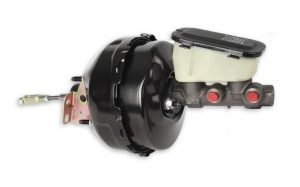Why is the brake pedal hard to push?
Sometimes the brake pedal can become hard to move, meaning the driver has to put more pressure on the brake pedal. This can be dangerous, especially if the driver is used to only applying minimal pressure to the brake.
Below are some of the most common causes of brakes being harder too push:
- Vacuum System Issues: Many vehicles use a vacuum-assisted brake booster to make braking easier. If there is a problem with the vacuum system, such as a vacuum leak or a faulty check valve, it can result in a hard brake pedal. Insufficient vacuum pressure can make it difficult to apply the brakes smoothly.
- Brake Booster Problems: The brake booster itself may be malfunctioning. It is responsible for increasing the force applied to the master cylinder when the brake pedal is pressed. If the booster is failing or not functioning properly, it can cause a hard brake pedal.
Brake booster replacement in Hamilton - Brake Fluid Contamination or Air in the System: Contaminated brake fluid or air bubbles trapped in the brake lines can affect the hydraulic pressure and result in a hard pedal feel. Contaminants in the brake fluid can cause the brake components to seize or not move smoothly, leading to increased resistance when pressing the pedal.
Brake fluid flush in Hamilton - Brake Caliper or Wheel Cylinder Issues: Problems with the brake calipers or wheel cylinders can also contribute to a hard brake pedal. If these components are seized or not releasing properly, it can create excessive friction and resistance when trying to apply the brakes.
Brake caliper replacement - Brake Master Cylinder Problems: The master cylinder is responsible for distributing hydraulic pressure to the brake calipers or wheel cylinders. If the master cylinder has internal issues, such as a damaged seal or a malfunctioning piston, it can result in a hard pedal feel.
Brake master cylinder replacement - Brake Pad or Shoe Problems: Worn-out brake pads or shoes can reduce the effectiveness of the braking system and make the pedal feel harder to push. When the friction material is worn down, it requires more force to generate the necessary braking power.
Brake pad replacement
What does the vacuum brake booster do?

The brake booster enhances the hydraulic effects of your vehicle’s braking system.
Inside the brake booster, a vacuum is used to make it easier for the driver to press the brake pedal down. Without the vacuum, the driver would struggle to press the brake pedal hard enough to stop the vehicle.
Direct Injection engines generally don’t get their brake vacuum from the intake manifold, instead, they create their own vacuum from a vacuum pump which has a vacuum pressure sensor attached to it. This way if the vacuum pump fails, which means your brakes will suddenly stop working properly, a light on the dash is instantly turned on to warn you.
What causes faults in the brake booster?
Most common brakes boosters are fully mechanical, meaning they have no electrical or electronic controls or sensors. There are several components that can fail in a brake booster system. These include:
- The brake booster vacuum chamber or brake booster vacuum diaphragm leaks.
- The vacuum line between the brake booster and the intake manifold.
- The one-way valve in the vacuum line between the brake booster and the intake manifold.
- Also for “direct injection engines” the vacuum pump itself can fail.
- Also for “direct injection engines” the electrical control circuit can fail.
Other symptoms of a failing brake booster:
Brakes are less responsive – Your vehicle may take longer to stop when the brakes are applied. This can cause safety hazards so we recommend that you get your vehicle fixed as soon as possible.
Loud hissing noise – This can be caused by a vacuum leak in the lines that supply your brake booster with air from the intake manifold.
Engine Idles differently when brake pedal depressed – this could indicate an issue with the vacuum supply to your brake booster, or possibly extra air entering the intake manifold when the brake pedal is depressed.
Please note any of the above symptoms will cause your vehicle to fail a Warrant of Fitness (WoF).
Brake Booster Vacuum Pump Replacement in Hamilton
If your vehicle is producing any of the symptoms above, we are able to help you!
If the brake booster or vacuum pump is causing the issue, we will install a new or aftermarket part in your vehicle. If the brakes are leaking, we will find the cause of the leak and fix it accordingly. Getting your brake booster and/or vacuum pump replaced will allow for improved braking with increased responsiveness.
For fast, honest, accurate diagnosis and reliable brake repairs in Hamilton, bring your vehicle to Grimmer Motors today.

